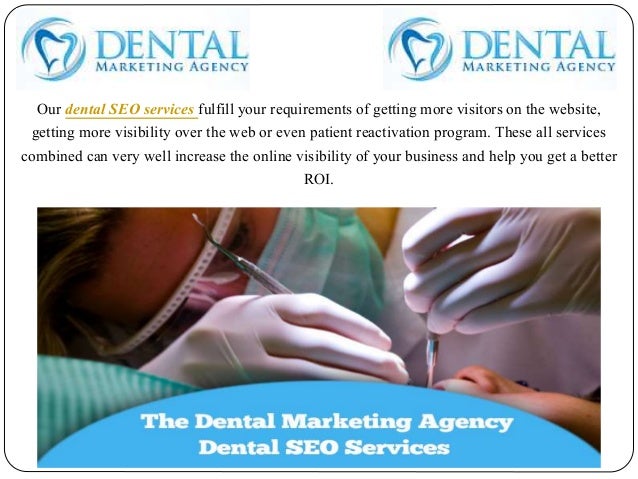SEO, or Search Engine Optimization, for dentists refers again to the process of optimizing a dental follow's web site and online presence to improve its visibility and ranking in search engine results pages (SERPs). The objective of dental SEO is to attract extra organic (non-paid) site visitors to the dentist's web site, thereby growing the probabilities of acquiring new sufferers. SEO for dentists entails various methods and methods tailored to the dental industry and local search.

Here are some key parts of SEO for dentists:
1. Keyword Research:
Identifying relevant keywords and phrases that potential sufferers may use when trying to find dental companies. This can embody specific remedies, procedures, or location-based keywords.
2. On-Page Optimization:
Optimizing the dentist's website structure, content material, and meta tags to make it search engine friendly. This contains using goal keywords naturally inside the web site content, optimizing title tags, meta descriptions, and header tags.
3. Local SEO:
Optimizing the net site for local search to draw patients from the dentist's geographical space. This includes creating and optimizing a Google My Business profile, acquiring online critiques, and ensuring correct and consistent business data throughout online directories.
four. Mobile-Friendliness:
Ensuring that the dentist's web site is mobile-responsive, as an growing number of users search for dental services on smartphones and tablets. Google also considers mobile-friendliness as a rating factor.
5. Quality Content Creation:
Creating high-quality, informative, and engaging content related to dentistry, oral health, and customary dental procedures. Regularly updating the website with blog posts, articles, or videos can entice natural visitors and set up the dental apply as an authority within the field.
6. Link Building:
Acquiring high-quality backlinks from reputable web sites, dental associations, and local businesses. Backlinks from authoritative sources can boost the website's credibility and enhance its search engine rankings.
7. Technical SEO:
Addressing technical elements of the website, such as optimizing web site velocity, fixing broken hyperlinks, ensuring safe connections (HTTPS), and creating an XML sitemap. Get more information ensures that search engines can crawl and index the web site successfully.
8. Social Media Integration:
Integrating social media profiles with the website and inspiring sufferers to share their experiences online. Social indicators, corresponding to likes and shares, can not directly impact search engine rankings.
9. Monitoring and Analytics:
Using tools like Google Analytics to watch website visitors, person habits, and conversion rates. Regular evaluation helps dentists understand the effectiveness of their web optimization methods and make data-driven decisions for improvement.
By implementing these search engine optimization methods, dentists can enhance their online visibility, appeal to more local sufferers, and set up a strong on-line presence of their neighborhood..
